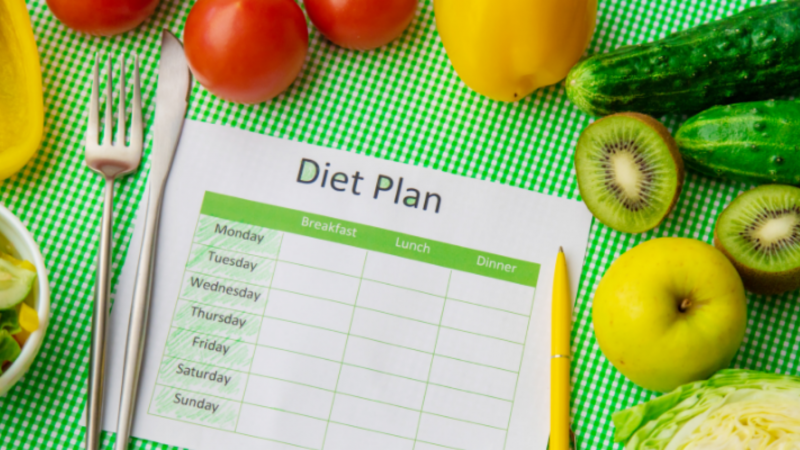7-day Indian Vegetarian Diet Plan For Weight Loss

If you are looking for a vegetarian diet plan for weight loss, you have come to the right place. This article explains how weight loss works, the benefits of a vegetarian diet, a sample vegetarian diet plan, and expert tips to help you follow it.
This 7-day Indian vegetarian diet plan is simple, easy to follow and healthy, packed with all the required nutrients.
The Science Behind Weight Loss
Your diet contributes to about 75% of your weight loss efforts. Hence, it is important to pay attention to the food you eat daily and the calories you consume. The formula is simple – by eating lesser calories than you burn, you can lose the excess weight and eventually maintain your ideal weight.
Studies suggest that a vegetarian diet helps with quicker weight loss, especially when combined with physical activity. A large cohort study carried out in the United Kingdom showed that people who changed to a diet with lesser animal foods over 5 years saw the least weight gain.[1]
DISCLAIMER:
It is crucial to verify the suitability of any diet plan to your unique health condition and weight loss needs. It is thus best to consult an experienced doctor and a qualified nutritionist before making any dietary changes. It will help prevent possible health complications.
What Is A Vegetarian Diet?
A vegetarian diet plan includes plant-based foods and food products with a restriction on consuming animal or animal-derived products. It is a healthy lifestyle choice, which also helps reduce your carbon footprint, a step towards protecting the environment.
There are different types of vegetarian diets: lacto-ovo-vegetarian, lacto-vegetarian, ovo-vegetarian and vegan, classified based on the food products included in each diet plan.
Benefits Of A Vegetarian Diet For Weight Loss
Several studies show that a vegetarian diet plan is far more effective and takes less effort in shedding extra harmful fat than non-vegetarian diets.
- Naturally Low In Calories: Plant-based food products are naturally less in calories than animal products such as meat, poultry or seafood.
- Better Satiety: A vegetarian diet comprises fibre-rich foods and consuming meals high in soluble fibre keeps you satiated for longer, maximising your weight loss efforts.
- Slimmer Physique: Largely, those who eat vegetarian foods have less body fat than those who consume animal or animal-derived products, resulting in a slimmer and leaner physique.
- Easy Digestion: Fibre-rich foods positively impact digestive health by improving bowel movement and maintaining healthy body functioning. This is crucial for weight loss and weight maintenance.
- Reduces Belly Fat: The high fibre in the vegetarian diet also helps in reduce stubborn belly fat. A large American study revealed positive associations between meat consumption and increased risk for obesity and central obesity [7] (excess accumulation in the abdominal area).
EXPERT ADVICE
Why Choose Vegetarian foods?
Here are scientifically-proven reasons to consider a vegetarian diet for weight loss:
- A plant-based diet helps increase “after-meal burn”. For people who struggle with weight and have a sluggish metabolism, a vegetarian diet can be a metabolic reboot.[2]
- Plant-based diets help reduce body fat by decreasing total calorie intake and increasing energy expenditure due to improved thermogenesis.[3]
- Plant-based diets are cost-effective, low-risk therapies for lowering BMI, blood pressure, HbA1C, and cholesterol levels.[4]
- Vegetarians lose weight at a rate of about 1 pound per week, regardless of whether or not they exercise.[5]
- Vegetarian diets are nutrient-dense and meet the standard dietary recommendations without compromising diet quality. They are also richer in fibre, Vitamins A, C, and E, thiamin, riboflavin, folate, calcium, magnesium, and iron.[6]
-Lavanya Parthasarathy, PhD, CDE
Essential Nutrition In A Vegetarian Diet
A balanced diet is crucial to stay healthy. This becomes even more important when you are trying to lose weight. A nutrient-rich vegetarian meal plan should include the following nutrients in optimal quantities:
- Proteins: Contrary to popular notion, there are plenty of options in the vegetarian diet plan that will fulfil your protein requirements, like nuts, seeds, legumes, tofu, quinoa, rice, grains and more.
- Iron: Iron helps in the healthy functioning of the red blood cells and keeps us energised. Good plant-based sources of iron include chickpeas, lentils, sprouted beans, dried apricots, dates, and green leafy vegetables.
- Omega-3: Vegetarian foods have a good amount of Omega-3 necessary for your brain and heart health. Some rich sources of Omega-3 include flax seeds, chia seeds and flaxseed oil.
- Vitamin B12: Vegetarians can get their share of Vitamin B12 from dairy products, soymilk and cereals. Some vegetarians also like to include eggs in their meals, which is also a good source of Vitamin B12.
Vegetarian Diet Food List
Here is an expert-approved list of vegetarian foods for weight loss. Do note that though there are several exotic protein-rich foods available in the market, there are plenty of locally-produced, traditional Indian foods that make for healthier options.
- Vegetables And Fruits: High-fibre vegetables like cauliflower, zucchini, mushrooms, broccoli, bell peppers, capsicum, spinach, and tomatoes. Fresh and seasonal fruits such as berries, bananas, apples, pears, citrus, and kiwi.
- Legumes: Lentils, kidney beans, soybeans, black beans, and chickpeas.
- Grains: Healthy grains include bajra, ragi, foxtail, brown rice, farro (khapli) and other locally grown millets.
- Proteins: Soybeans, avocado, tofu or soya paneer, legumes like chickpeas, kidney beans, nuts, seeds, nut butter, Greek yoghurt, and milk.
- Fats: Olive oil, coconut oil, nut butter, cheese, etc.
- Beverages: Water is the healthiest no-calorie beverage, but you can also include tea, coffee, coconut water, and fruit-infused water to diversify.
- Nuts And Seeds: Almonds, walnuts, chia seeds, flax seeds etc.,
- Herbs And Spices: Herbs and spices such as cinnamon, cardamom powder, etc. are flavoursome and aid in weight loss.
EXPERT ADVICE
5 Vegetarian Nutrient Bombs For Weight Loss
- Cinnamon: Cinnamon improves insulin sensitivity and lowers blood sugar levels, both important for weight loss. It also boosts your metabolism.
- Millets: Millets are rich in fibre and bio-active chemicals that keep our stomachs full for extended periods, reducing the urge to mindless snacking.
- Spinach: It is rich in fibre, vitamins, minerals, and antioxidants. The high fibre content and less calorie content in spinach aid weight loss. It is also high in thylakoids (a chlorophyll-containing plant component) that aid healthy weight loss, and reduce blood lipid and glucose levels.
- Horse gram: It is a high-protein, high-fibre legume that increases appetite-suppressing hormones while lowering the levels of the hunger hormone ghrelin, aiding weight loss.
- Flaxseeds: They are rich in fibre and lignin, a complex polymer found in cell walls. Lignin helps in weight loss and reduces blood pressure.
-Lavanya Parthasarathy, PhD, CDE
Top 5 Expert Tips To Follow While On A Vegetarian Diet For Weight Loss
Eat Small, Frequent Meals: Instead of having 2-3 full meals, you can have five smaller meals at regular intervals to keep hunger pangs away. Eating in sufficient portions will reduce overall calorie consumption and avoid overeating.
Two Simple Rules: Don’t skip meals. Make sure you include nutrient-dense foods as they prevent you from binging on snacks or overeating other meals. Try to make your evening meals lighter, as the body’s metabolism usually slows down as the day progresses. It is ideal to eat two hours before going to sleep.
Include Fibre-Rich Foods: Opt for high-fibre vegetables, fruits and grains that promote fullness and keep you satiated for long. Foods rich in protein and complex carbs and unprocessed foods boost fullness while regulating your hunger hormone ghrelin, aiding weight loss.
Stay Hydrated: Stay hydrated throughout the day to eliminate toxins from the body while curbing frequent hunger pangs.
Foods To Avoid In A Vegetarian Diet To Lose Weight
- Refined carbs such as white bread and instant foods.
- Sugary foods and beverages such as sodas, candies, pastries, cookies, energy drinks, etc. as they have no nutritional value.
- Highly-processed or packaged foods such as ice creams, meal replacements and frozen foods.
7-Day Indian Vegetarian Diet Chart For Weight Loss
Here is a sample 7-day Indian vegetarian diet plan to consume 1,200-1,500 calories a day:
Day 1
Breakfast: Lemon detox water, around one cup of oatmeal cooked in water, topped with some honey and cut fruits like apples or raspberries.
Lunch: Vegetable salad bowl made from baby spinach, cucumber, cherry tomatoes, olive oil dressing and one cup of green tea.
Dinner: Vegetable wrap, made of whole wheat roti with tofu slices.
Day 2
Breakfast: One cup of peas poha and one cup of coffee without sugar.
Lunch: One cup of mixed vegetable curry with ½ a cup of brown rice.
Dinner: One cup of broccoli soup with one toasted multi-grain bread.
Day 3
Breakfast: Lemon honey detox water, fruit smoothie with one peanut butter toast.
Lunch: Millet , like foxtail and vegetables with one cup of coffee in almond milk and little sugar.
Dinner: Yellow lentil dal with 3/4th cup of brown rice and salad.
Day 4
Breakfast: Lemon detox water, two multi-grain rotis stuffed with vegetables and one cup of curd. Finish it off with a tiny cup of green tea.
Lunch: An Indian burrito bowl full of vegetables,brown rice along with the homemade mint-basil sauce.
Dinner: Low-fat paneer curry with two multi-grain rotis and salad.
Day 5
Breakfast: Lemon detox water, oatmeal made in water and little unsweetened almond milk topped with chia seeds and cinnamon.
Lunch: One cup of tofu curry with two multi-grain rotis or 3/4th cup of brown rice, curd and green salad.
Dinner: Vegetable multi-grain wrap made of cottage cheese, mint chutney and vegetables, and one cup of chamomile tea.
Day 6
Breakfast: Chia seed water, two multi-grain idlis with homemade coconut and mint chutney and one cup of rasam.
Lunch: Vegetable sambar with one cup of brown rice and salad and one cup of buttermilk.
Dinner: Lauki sabzi and one cup of lentil soup without tadka, two multi-grain rotis and salad.
Day 7
Breakfast: Cinnamon detox water, besan chila with mint and garlic chutney and one medium apple.
Lunch: Chickpea and spinach curry with one cup of brown rice, curd and salad.
Dinner: Mixed vegetable soup and one whole-grain toast.
Take Away
Following a vegetarian diet is a great way to lose weight and maintain it but remember that not all vegetarian foods are low in calories or healthy. Choose foods that aid weight loss and keep you fit.
If you are looking for expert advice and a customised diet plan, visit Oliva Skin & Hair Clinic in Hyderabad, Bangalore and Chennai today!
Our certified subject matter experts do extensive research and collate facts from reputed scientific journals and international studies to create informative and engaging articles related to all your dermatology concerns. They strive to help you decipher medical jargon, distinguish fact from fiction and overcome paranoia. Our qualified medical board or expert panel goes a step further to verify these facts based on their rich academic knowledge, vast clinical experience and critical industry insights to ensure you consume only medically accurate content that empowers you to make informed decisions about your hair and skin-care treatments and weight management. Check out our Editorial policy for further details
https://www.ncbi.nlm.nih.gov/pubmed/29483085
https://pubmed.ncbi.nlm.nih.gov/19351712/
https://www.ncbi.nlm.nih.gov/pubmed/12442909
https://www.ncbi.nlm.nih.gov/pmc/articles/PMC3257742/
https://www.ncbi.nlm.nih.gov/pubmed/16400055/
History








